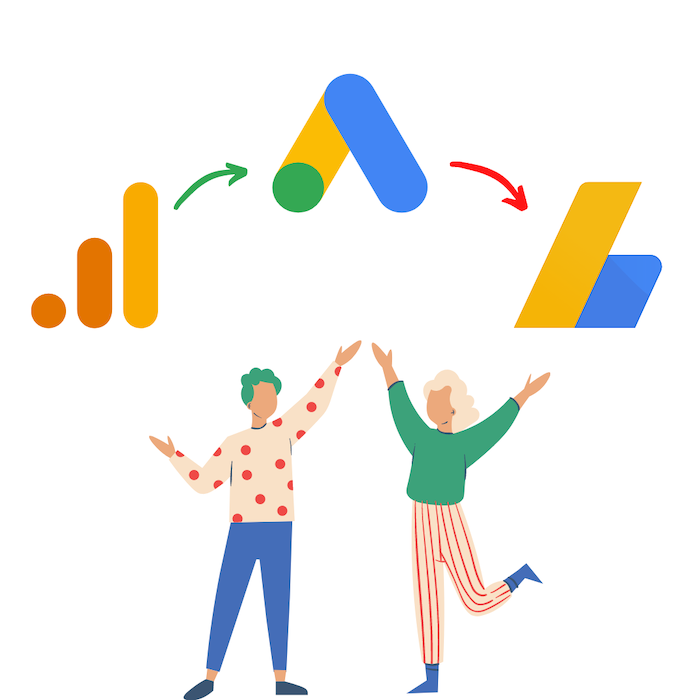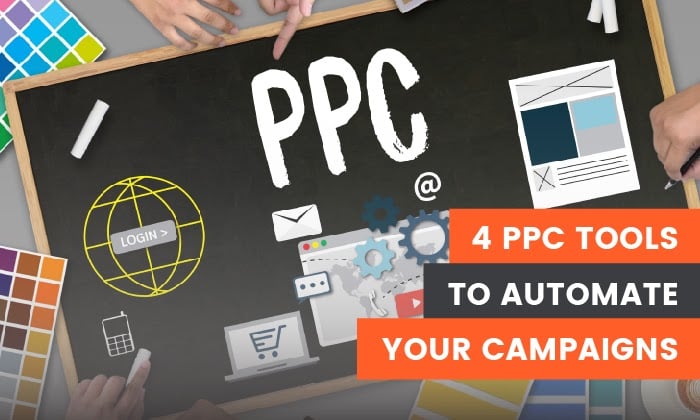
The field of ppc (pay-per-click) is constantly evolving. If you use tools that automate some of the ad campaign processes, your campaigns may become more efficient and effective.
Pay-per-click automation tools allow marketers to automate some tasks by using third-party applications. These tools can save you time, improve campaign performance, and reduce wasted ad spends.
Rather than spending your time hovering over dozens of campaigns, you can focus on tasks like pinpointing areas for business growth, increasing audience engagement, and exploring new ad types that will benefit your sales funnels.
That isn’t to say automation is the key to the future, nor are we all going to be replaced by machines. Paid ad campaigns might always need humans to power them, but you can at least catch a break from constant campaign monitoring.
To start this off, let’s take a deeper dive into what PPC automation is.
What Is PPC Automation?
PPC automation refers to the system that charges marketers every time their ad is clicked.
PPC automation allows marketers to control their Google ad campaigns through machine learning, without spending hours tediously updating scope, timing, and targeting. By automating some of the systems and steps, you can leverage third-party applications to do the hard work for you.
For example, if you want your ad to stop running on a certain day, or if you want to change the target audience before the end of the running cycle, you can use PPC automation to control these details. This means no more activating, deactivating, and adjusting your ads by hand.
What a relief.
It also means you can shift your focus back to generating leads and growing your business and let the machine do the hard work for you.
PPC automation tools are a great way to optimize ad performance and focus your time on your larger marketing goals.
Why is PPC Automation a Popular Method?
PPC automation tools allow you to keep up with search engine marketing trends while also giving yourself the time to focus on optimization.
For example, when AdWords became Google Ads, many of the original tools and features were replaced. For a human, relearning these tools can be time-consuming and frustrating. For a machine, it’s instant.
Google actually suggests using PPC automation and smart ad bidding, as it saves you time and increases the performance of your ads.
Think about it this way. Let’s say you’re new to the paid ad world and want to launch your first PPC campaign.
You don’t know much about online paid advertising, but you understand how to target an audience and want a lower cost-per-click. With PPC automation, you can simply enter your campaign goals, choose your smart bidding strategies, and let the machine do the rest.
Even if Google Ads completely overhauls its system the next day, your machine will still know what to do. That means you can take the extra time to learn more about manual targeting or growing your online community.
Pros and Cons of PPC Automation
Manual bidding can be a great asset to a campaign and offers unique ways of winning conversions and lowering ad cost rates. That being said, it only works when done correctly.
Humans often make errors that machines don’t. It’s not that we aren’t as good as they are, but we are more prone to making simple mistakes. The benefit of automated bidding and ad management is you don’t have to worry about those small, silly mistakes, like targeting the wrong audience. In contrast, leaving the work up to a machine can mean less personalization and some important details may be overlooked.
Let’s take a more in-depth look at the pros and cons of PPC automation tools.
Pros of PPC Automation
PPC automation tools work best for long-term, ongoing campaigns. This is because to create a detailed automated system, you need to have relevant data to feed into it. If you’ve just started a new campaign with a new client and you don’t have any reference data to turn to, it might not be the best time to jump into automation.
That being said, once you get the ball rolling, PPC automation tools can save you a lot of time and money when maintaining and monitoring your PPC campaigns.
If a machine can do it just as well as we can, why not let it?
Cons of PPC Automation
Even though it might seem like a set and forget system, there are many details that go into the initial setup of automated PPC campaigns.
For example, you still need to determine which bidding strategies fit your business or what kind of results you want to target.
Also, even an automated campaign can have hiccups. It’s essential to continue monitoring your campaigns even if you choose to use automated PPC tools. The work involved in an automated PPC campaign could be less intense than a manual campaign, but don’t let this make you become a lazy marketer just because you think the computer is handling it.
If you’d rather something else handle your PPC campaigns, my agency is accepting new PPC clients.
Types of PPC Automation
PPC automation is a growing marketing trend and will only get stronger as our paid ad tools evolve. Getting familiar with these tools sooner rather than later will ensure your business can automate and optimize as much as possible.
PPC automation tools range in complexity and cost. You can find ways to automate pretty much anything – it’s just a matter of which steps you want to automate and how much work you are willing to put into your campaigns.
Here are 4 of the most basic ways to use PPC automation.
Integrations and Reporting
Reporting is undoubtedly one of the most frustrating parts of a PPC manager’s life. Think of all the hours spent compiling data, creating spreadsheets, and importing sources to create custom reports.
Automating your reporting systems through integrations can help make this process more efficient. No more manually exporting spreadsheets and no more comparing data.
Integration refers to the different apps and platforms you may want to pull data from when preparing reports. These could be platforms such as Google Ads or Instagram Insights.
When choosing an automated reporting software, be sure to check that it offers the integrations you will need.
Here are a few easy-to-use PPC reporting tools to help make your reporting easier:
Swydo
Swydo was built for PPC managers and is a simple way to automatically integrate data sets from various sources like Facebook Insights or Bing Ads.
Swydo can also help you monitor your clients’ key points of interest and translate them easily into your reports.
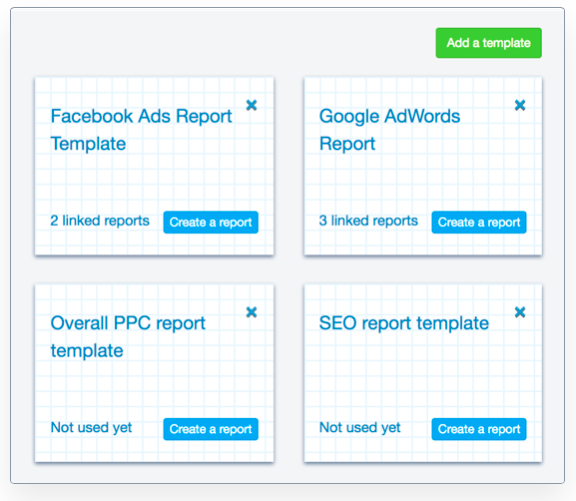
Swydo also lets you schedule your reports so they can be automatically sent to your team or clients, saving you an end-of-the-month scramble.
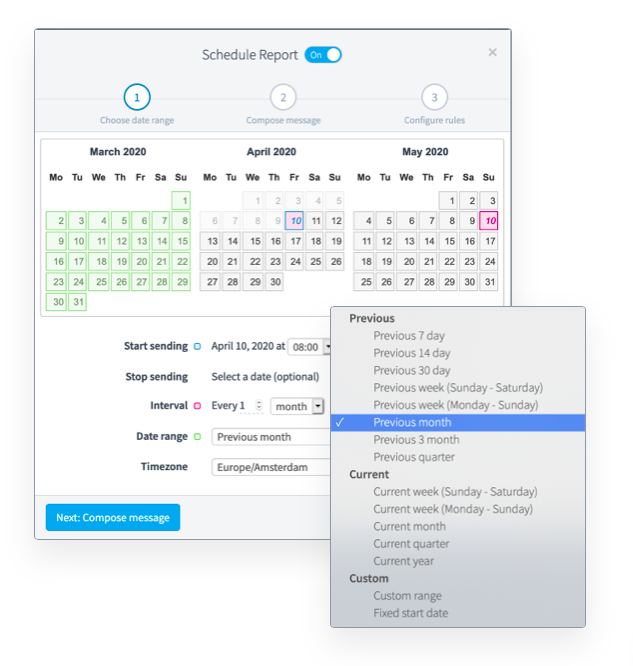
Swydo claims to help you increase client retention through their automated reporting systems. Pricing starts at $62.00 per month.
Reporting Ninja
Reporting Ninja boasts more than sixteen different integrations and has a range of reporting templates.
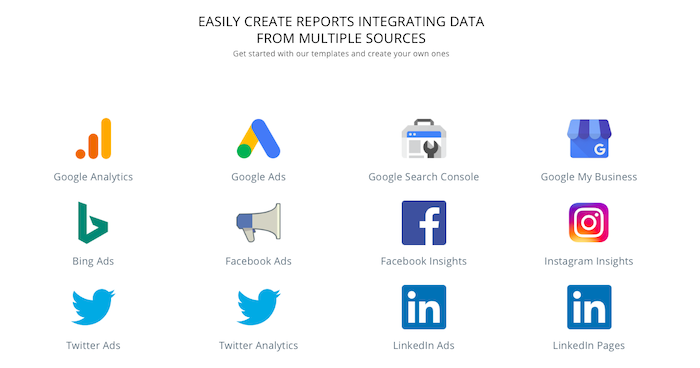
Plus, it includes cross-platform comparisons so you can combine data from multiple platforms into a single chart or graph.
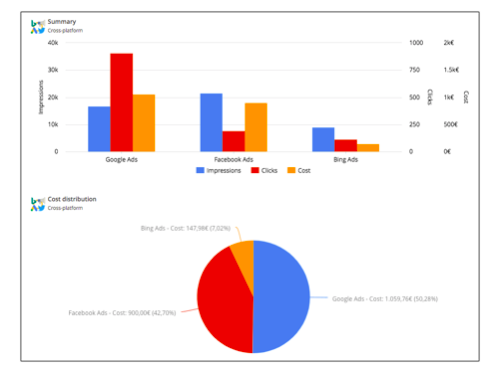
Reporting Ninja can also help you create SEO and conversion reports on top of your PPC reports. Plans start at $20.00 per month, which includes ten reports.
Report Garden
Report Garden can help you create client reports, monitor budgets, and add new PPC campaigns, all in one app.
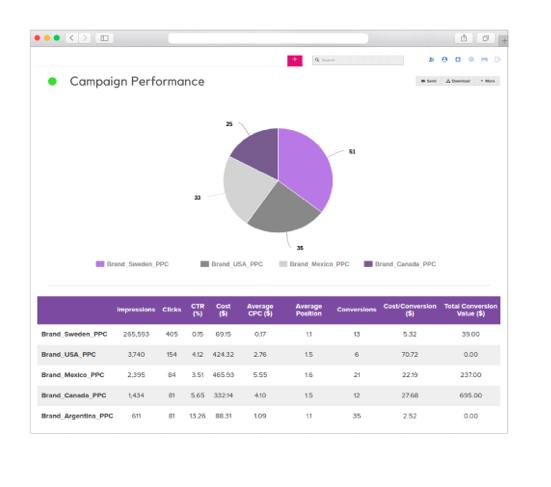
Their creative visual reports will help you look great in front of your clients or company leadership.
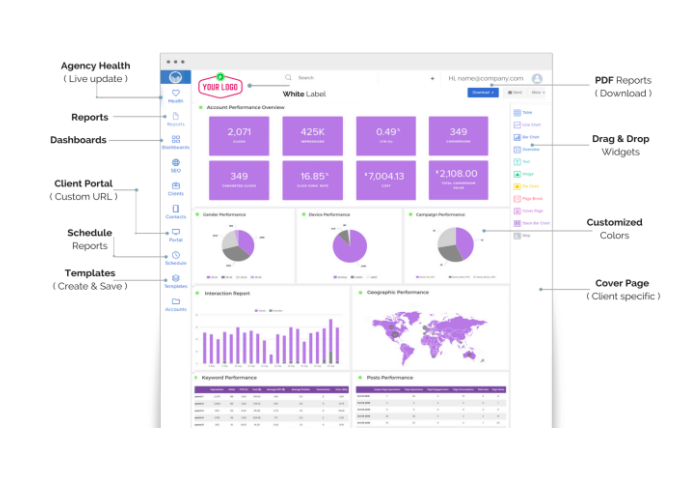
They also have a range of interactive dashboards so your clients can see their reports in real-time.
Report Garden plans start at $250.00 per month for ten clients. Dashboards and reports are unlimited for your clients to access. Learn more about how automating reports helped this agency scale from 25 to 500 accounts with Report Garden on their blog.
Scripts
Scripts are Javascript code pieces that can tell your ads to perform certain functions based on performance data that you input. Scripts can help you customize specific parts of your campaign to automate and let you pick what data points to use and when.
For example, if you want to add ad schedules for a campaign, you might use a script that looks like this.
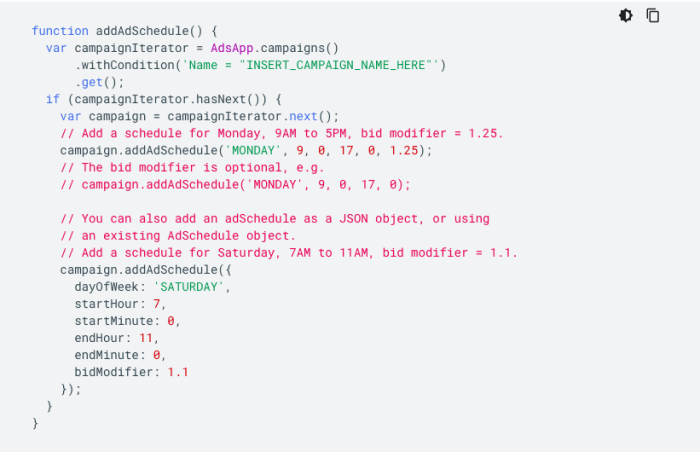
You don’t have to be a coder to use these scripts. Google has a whole library of code scripts you can use if you’re new to this method.
Scripts are a great way to do split testing, big management, and reporting. They can be used to automate internal or external functions and save you a lot of time in PPC account maintenance.
Custom Builds
Custom builds are certainly the most complicated area of PPC automation. These builds require some expertise, so you might need a developer to help you get started.
Custom builds are coded automations that allow you to customize almost anything in your ads. These builds will enable you to focus on unique metrics and create columns that can segment account data down to its finest points.
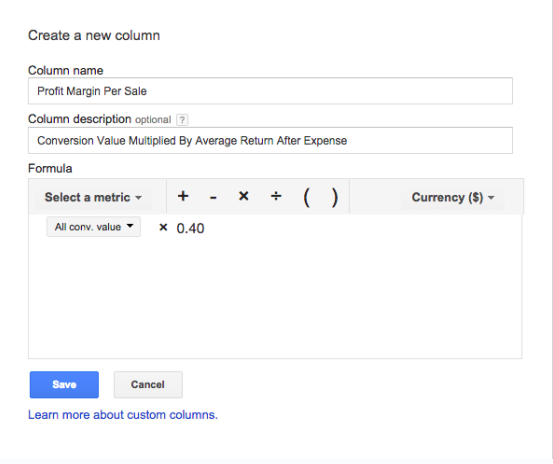
Google describes customization like this:
For example, to see the percentage of clicks you get from mobile devices, create a custom column that divides mobile clicks by total clicks. Or let’s say you’re a shoe retailer and enjoy a 40% profit margin for each pair of shoes you sell. To understand your total profit for each sale, ensure your conversion value column tracks revenue. Then, create a custom column that multiplies conversion value by 40% and call it ‘Estimated Profit.’
Comprehensive Software
Comprehensive software platforms allow you to customize, automate, and manage your ad campaigns in a more user-friendly fashion than custom builds allow. A comprehensive software would enable you to do everything we discussed above and more from one simple platform.
Here are a few of the best PPC automation software tools out there, so you can get the most out of your paid ad strategy.
WordStream PPC Advisor
WordStream PPC Advisor is a great pick for small businesses ready to jump into PPC campaigns but don’t have large budgets or big staff rosters to support them.
WordStream offers Google Ads, Bing Ads, Facebook, LinkedIn, and Twitter integrations as well as report building, data analytics, and landing page optimization.
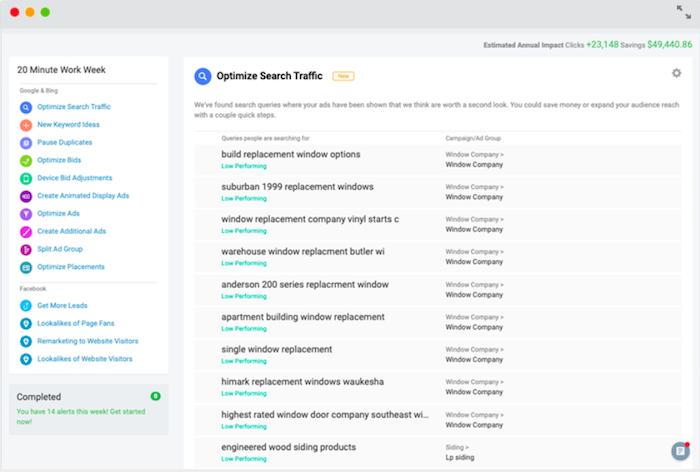
WordStream PPC Advisor plans start at $264.00 per month for 12-month plans.
Optmyzr
Optmyzr is a good choice if you’re running multiple PPC campaigns and are looking for a range of automation features.
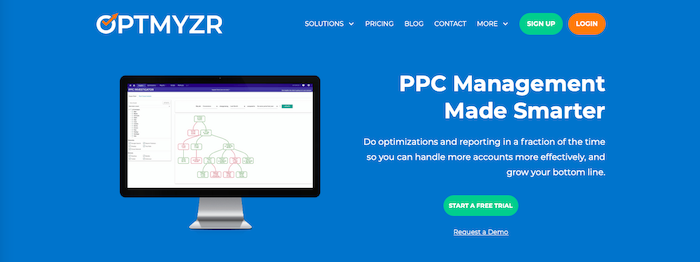
With Optmyzr, you can create, track, and report on your PPC campaigns. You can also automate scripts and alerts directly from the platform. Optmyzr offers integrations for Google Ads, Yahoo Ads, and Bind Ads.
Plans start at $499.00 per month for the pro version.
Google Ads Editor
Google Ads Editor is free for anyone using Google Ads software.
It’s a great platform for managing your Google ads to create, track, and edit your ads directly from the software. You can also make bulk changes, which is a big benefit when running multiple campaigns for a single client.
Here’s a short explainer video:
Although Google Ads Editor is great for managing your Google Ads, it doesn’t offer much integrations. If you’re running ads on multiple search engines or platforms, then you might find this software limited.
Semrush PPC Toolkit
The PPC management software toolkit offered through Semrush is a great asset to campaign planning, keyword research, and competitor research. This tool lets you easily see how you rank against your competitors and how you can modify your ads to out-perform them.
It also offers a range of SEO features like the Keyword Magic Tool, which can show you search volume data alongside suggestions for stronger keywords. (You can also pull keyword data from my tool, Ubersuggest.)
Semrush offers a tiered pricing plan, which starts at $99.00 for the pro version, $199.00 for the guru version, and $399.00 and up for the business version.
Still unsure if you can make paid advertising work for your business? Watch the video below to find out how you can get the conversions you want from paid ads.
Conclusion
Ready to launch a high-conversion PPC campaign?
Interested in using PPC to diversify your web traffic and boost your business?
With these great PPC automation tools, you’ll be able to tap into the benefits of paid advertising and start making conversions that matter.
What are some of the ways you’ve found success with PPC automation?
The post 4 PPC Tools to Automate Your Ad Campaigns appeared first on Neil Patel.
About us and this blog
We are a digital marketing company with a focus on helping our customers achieve great results across several key areas.
Request a free quote
We offer professional SEO services that help websites increase their organic search score drastically in order to compete for the highest rankings even when it comes to highly competitive keywords.
Subscribe to our newsletter!
More from our blog
See all postsRecent Posts
- Web Hosting September 26, 2023
- Affiliate Management September 26, 2023
- Online Presence Analysis September 26, 2023


